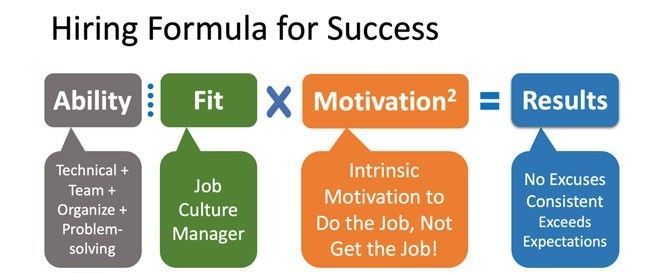Assessing Candidates Motivated To Do the Job vs Just Getting the Job
As recruiters and hiring managers, it's important we focus on self-motivated candidates and allow them to succeed in their roles, encourage them for future challenges and give them tools to further enhance their careers. All too often, we need to be more flexible in our job descriptions, how we source and screen candidates, conduct interviews, facilitate hiring decisions and make offers.

Historically, we've hired people with the technical skills and core competencies that match the job description. However, we need to hire better for an individual's personal motivation skills that complement the job. It's essential to refrain from overselling a role and ensure that candidates will be happy and content in their workplace.
Focus on self-motivated candidates who will take pride in their work.
It's not the be-all and end-all that candidates are qualified for the role; they need to be motivated. Often, recruiters and hiring managers assume that candidates intrinsically have motivation. Candidates will show up for an interview with energy, enthusiasm and heaps of questions related to the role; these attributes can easily be mistaken for motivation. How do you evaluate whether a candidate is qualified, capable and motivated?
Often, your feedback post-interview could include the following;
- They were so passionate about our mission and seemed excited about the role and working with our company
- He asked lots of pertinent questions about the job and the company in general
- She's got several years of experience in a similar role; this new job would be regarded as a promotion; she seemed really interested
Whilst all of these statements seem positive, they are loaded with uncultivated assumptions that don’t allow hiring managers to understand the candidate's primary motivation thoroughly. As a recruiter, have you accurately evaluated and shared the expectations of the job role? How precise is your job advert? Is your brand messaging too generic to describe the anticipated workload?
How to effectively evaluate a candidate's motivation:
- Break down the job into realistic terms
- Be clear on what the candidate will do on a daily basis
- What value will they bring to the company?
- Explain the repetitiveness of tasks within the role
- Will the candidate need to deal with high-stress circumstances?
- What are the differences between your company's role and that of a competitor?
- What are your development practices?
Is the candidate fit for the role? For example, if the role includes regular networking, is the candidate confident conversing with strangers?
Can the candidate deal with conflict? If not, perhaps they are not ideal for a supervisor's role.
In other words, be curious, dig deep into the role, and clearly focus on the candidate’s strengths and weaknesses to ensure a perfect fit and that they actually want to do the job!
There’s a host of different questions that you can ask your candidates to understand their motivation:
- You’ve worked in a similar role before; what are your expectations with us, and what do you hope will be different?
- Do you enjoy your current role? Have you faced any challenges? What did you do to solve them? What part of the job would you like to omit in your next role?
- After discussing the day-to-day duties of the role, ask the candidate open-ended questions about what they’ve done before, what they liked and disliked and if they experienced any challenges
- Discuss whether the role is what they expect, if it includes similar duties, and if they are comfortable adding new tasks
- Ask them for their feedback about the role, if they have any questions and how it matches their expectations
- What’s pushed you to do your very best in your previous roles?
- Why did you choose this line of work? What do you enjoy most?
- Describe a work environment where you’d feel most productive and happy
Past behaviour predictors
Consider past behaviours so that you can predict their future performance. You can delve into how the candidate has reacted to specific situations in the past, giving you an understanding of how they may respond in future roles. You can use this to your advantage and ask behavioural-led questions revealing the candidate’s motivation. You’ll be able to identify different character traits and assess their critical thinking, willingness to learn and leadership skills painting an accurate picture of the candidate.
Transparency is key
By having a transparent and friendly discussion, as a hiring manager or recruiter, you'll learn so much more about the candidate and have a deeper understanding of their expectations and whether they will fit into your current team. Try to get them to open up and talk to you so that you can understand them, which will be a hugely positive experience for both parties. Encourage them to talk about their work history and understand what makes them tick. It could also include personal details such as their family, hobbies, and what they love about their current role. Frame the interview around their motivations and listen carefully to their responses. It might be that the role is customer-facing, but the candidate is shy and cautious about meeting new people. Listen to their questions. Are they excited about learning about the new role and different tasks and that their natural curiosity shines through?
Our role as human resources professionals, recruiters and hiring managers is to go beyond a job match and assess their career trajectory, general passions and intrinsic interest in the title or level of the role. We need to define and explain our expectations for the role better and use various techniques to identify evidence, not conjectures, when making long-term hiring decisions. By considering job-specific motivation, you can predict on-the-job success related to the candidate's role.



